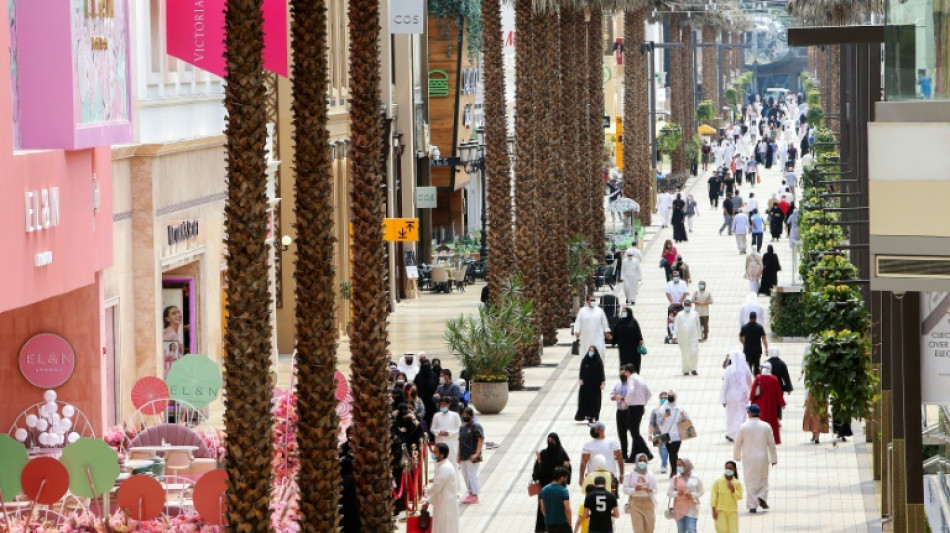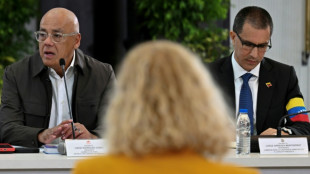
-
 NFL names 49ers to face Rams in Aussie regular-season debut
NFL names 49ers to face Rams in Aussie regular-season debut
-
Bielle-Biarrey sparkles as rampant France beat Ireland in Six Nations

-
 Flame arrives in Milan for Winter Olympics ceremony
Flame arrives in Milan for Winter Olympics ceremony
-
Olympic big air champion Su survives scare

-
 89 kidnapped Nigerian Christians released
89 kidnapped Nigerian Christians released
-
Cuba willing to talk to US, 'without pressure'

-
 Famine spreading in Sudan's Darfur, UN-backed experts warn
Famine spreading in Sudan's Darfur, UN-backed experts warn
-
2026 Winter Olympics flame arrives in Milan

-
 Congo-Brazzaville's veteran president declares re-election run
Congo-Brazzaville's veteran president declares re-election run
-
Olympic snowboard star Chloe Kim proud to represent 'diverse' USA

-
 Iran filmmaker Panahi fears Iranians' interests will be 'sacrificed' in US talks
Iran filmmaker Panahi fears Iranians' interests will be 'sacrificed' in US talks
-
Leicester at risk of relegation after six-point deduction

-
 Deadly storm sparks floods in Spain, raises calls to postpone Portugal vote
Deadly storm sparks floods in Spain, raises calls to postpone Portugal vote
-
Trump urges new nuclear treaty after Russia agreement ends

-
 'Burned in their houses': Nigerians recount horror of massacre
'Burned in their houses': Nigerians recount horror of massacre
-
Carney scraps Canada EV sales mandate, affirms auto sector's future is electric

-
 Emotional reunions, dashed hopes as Ukraine soldiers released
Emotional reunions, dashed hopes as Ukraine soldiers released
-
Bad Bunny promises to bring Puerto Rican culture to Super Bowl

-
 Venezuela amnesty bill excludes gross rights abuses under Chavez, Maduro
Venezuela amnesty bill excludes gross rights abuses under Chavez, Maduro
-
Lower pollution during Covid boosted methane: study

-
 Doping chiefs vow to look into Olympic ski jumping 'penis injection' claims
Doping chiefs vow to look into Olympic ski jumping 'penis injection' claims
-
England's Feyi-Waboso in injury scare ahead of Six Nations opener

-
 EU defends Spain after Telegram founder criticism
EU defends Spain after Telegram founder criticism
-
Novo Nordisk vows legal action to protect Wegovy pill

-
 Swiss rivalry is fun -- until Games start, says Odermatt
Swiss rivalry is fun -- until Games start, says Odermatt
-
Canadian snowboarder McMorris eyes slopestyle after crash at Olympics

-
 Deadly storm sparks floods in Spain, disrupts Portugal vote
Deadly storm sparks floods in Spain, disrupts Portugal vote
-
Ukrainian flag bearer proud to show his country is still standing

-
 Carney scraps Canada EV sales mandate
Carney scraps Canada EV sales mandate
-
Morocco says evacuated 140,000 people due to severe weather

-
 Spurs boss Frank says Romero outburst 'dealt with internally'
Spurs boss Frank says Romero outburst 'dealt with internally'
-
Giannis suitors make deals as NBA trade deadline nears

-
 Carrick stresses significance of Munich air disaster to Man Utd history
Carrick stresses significance of Munich air disaster to Man Utd history
-
Record January window for transfers despite drop in spending

-
 'Burned inside their houses': Nigerians recount horror of massacre
'Burned inside their houses': Nigerians recount horror of massacre
-
Iran, US prepare for Oman talks after deadly protest crackdown

-
 Winter Olympics opening ceremony nears as virus disrupts ice hockey
Winter Olympics opening ceremony nears as virus disrupts ice hockey
-
Mining giant Rio Tinto abandons Glencore merger bid

-
 Davos forum opens probe into CEO Brende's Epstein links
Davos forum opens probe into CEO Brende's Epstein links
-
ECB warns of stronger euro impact, holds rates

-
 Famine spreading in Sudan's Darfur, warn UN-backed experts
Famine spreading in Sudan's Darfur, warn UN-backed experts
-
Lights back on in eastern Cuba after widespread blackout

-
 Russia, US agree to resume military contacts at Ukraine talks
Russia, US agree to resume military contacts at Ukraine talks
-
Greece aims to cut queues at ancient sites with new portal

-
 No time frame to get Palmer in 'perfect' shape - Rosenior
No time frame to get Palmer in 'perfect' shape - Rosenior
-
Stocks fall as tech valuation fears stoke volatility

-
 US Olympic body backs LA28 leadership amid Wasserman scandal
US Olympic body backs LA28 leadership amid Wasserman scandal
-
Gnabry extends Bayern Munich deal until 2028

-
 England captain Stokes suffers facial injury after being hit by ball
England captain Stokes suffers facial injury after being hit by ball
-
Italy captain Lamaro amongst trio set for 50th caps against Scotland


'Great misery': Kuwait political crisis drags down economy
A seemingly never-ending political crisis is plunging oil-rich Kuwait's economy into the mire, affecting basic services and causing mounting public concern.
Despite its large oil reserves, hospitals and educational services are in decay as squabbling paralyses the wealthy Gulf region's only fully elected parliament.
Ahmed al-Sarraf, a businessman and newspaper columnist, says his concerns are growing as the country falters.
"I feel great anxiety for my family, for the future of my grandchildren, for their education, and for my health," the former banker told AFP.
"This situation is generating great misery."
Kuwait, which borders Saudi Arabia and Iraq, is home to seven percent of the world's crude reserves. It has little debt and one of the strongest sovereign wealth funds worldwide.
However, it suffers from constant stand-offs between elected lawmakers and cabinets installed by the ruling Al-Sabah family, which maintains a strong grip over political life, despite a parliamentary system in place since 1962.
The stasis has prevented lawmakers from passing reforms to diversify the economy, while repeated budget deficits and low foreign investment have added to the air of gloom.
The latest twist came last month, when the constitutional court dissolved an opposition-controlled assembly over alleged electoral irregularities and reinstated the previous parliament.
- 'Political dysfunction' -
Kuwait's parliament has now been dissolved around a dozen times in its 61-year history.
In January, Kuwait's government resigned three months after it was sworn in due to disputes with lawmakers. It was the sixth government in just three years.
Kuwait's neighbours the UAE, Saudi Arabia and Qatar have managed to transform their desert nations into booming modern metropolises, largely thanks to oil wealth and foreign investment.
Led by a new generation of rulers, they are stepping up projects to wean their hydrocarbon-centred economies away from oil.
Meanwhile Kuwait, led by 82-year-old Crown Prince Mishal al-Ahmad al-Jaber Al-Sabah, is struggling to implement a reform plan adopted in 2018.
"We were a liberal and innovative country in the 1980s... but we died out while the countries around us developed," the businessman Sarraf said.
According to economist Justin Alexander, "political dysfunction" has kept Kuwait from living up to its full economic potential.
The paralysis "has prevented it from taking painful reforms to control spending growth, generate non-oil revenue, diversify its economy or even invest to maintain its oil production capacity," the Gulf expert said.
Kuwait, which posted large deficits during the Covid-19 pandemic, was buoyed last year by the rise in oil prices, which generate most of the state's income.
But as prices stabilise, the country's budget deficit is expected to widen.
- Kuwait 'needs a reset' -
In January, the caretaker cabinet submitted a draft 2023-2024 budget that projected a deficit of five billion dinars (more than $16 billion) for the year starting in April.
That compares with a 1.35-billion-dinar surplus expected for the current year, according to Bloomberg.
Before Kuwait's last cabinet resigned in January, it had promised to tackle state spending and fight corruption.
It stepped down to outmanoeuvre lawmakers who were pressing ministers to pass a costly debt relief bill that would grant a debt amnesty for Kuwaiti citizens.
Kuwait "has a governance crisis", said researcher Kristin Diwan, of the Arab Gulf States Institute in Washington.
This is "apparent in systemic malaise, in failures of planning and in mounting social woes", including over the deterioration of public services, the expert said.
While politicians squabble, Kuwaiti citizens are paying the price, said Bader al-Saif, assistant professor of history at Kuwait University.
The "Kuwaiti street is exhausted," he said on Twitter, decrying a "perpetual impasse".
"Kuwait's politics needs a reset," Saif added, calling for a national dialogue and a new constitution.
Z.AbuSaud--SF-PST




